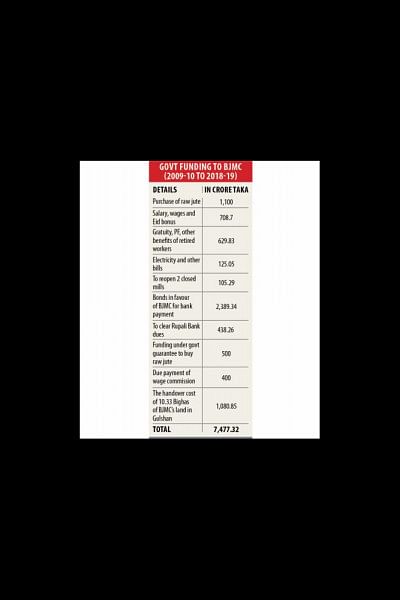Jute Mill Workers: Govt to give Tk 200cr to pay arrears

The government is going to allocate Tk 200 crore to pay a portion of the arrears of workers and officials of state-owned jute mills ahead of the Eid, officials said yesterday.
Finance Minister AHM Mustafa Kamal might give the clearance in a day or two, they added.
The move comes following countrywide demonstrations by workers for around two months to press home their nine-point demand, including payment of their due wages, in some cases for up to 12 weeks.
The finance ministry agreed to give the money to Bangladesh Jute Mills Corporation (BJMC) after the Corporation sought Tk 337 crore to clear wages and salaries of employees of 22 state-run jute mills.
Officials said the finance ministry was initially unwilling to provide the fund to the BJMC due to the mills’ consistent losses, resulting mainly from outdated technology, inefficiency and corruption.
Since 2009, the government gave the BJMC Tk 7,477 crore to bail it out of its financial troubles, accord-ing to finance ministry data.
Jute and textiles Secretary Mizanur Rahman said he was yet to get official confirmation, but said he hoped everything would be finalised by today.
“We will not wait a moment to pay the workers after we get the money,” he said, adding that the BJMC would need more money soon as the amount was short of its requirement.
Earlier, the government asked the BJMC to send a list of workers, their bank accounts and other details to pay wages through their bank accounts and curb scope of misappropriation by a section of officials by showing “ghost workers,” sources said.
The BJMC submitted the list on May 20.
Mizanur said they were yet to decide whether to pay the money directly to the workers or through the BJMC.
“There are issues like provident fund, which the mills authorities deposit in the bank account. If the fi-nance ministry wants to pay the arrears directly, it could create complexities,” he said.
Workers of 22 state-owned jute mills had been demonstrating since March 29.
Their demands include clearing retirement benefits of thousands of workers; pay arrears of life insurance policies of deceased workers; reinstate terminated and suspended workers; pay arrears and allowances; implement the new pay structure (2015); make workers’ job permanent as per the law; allocate fund to purchase jute on time; undertake BMRE (Balancing, Modernisation, Rehabilitation, and Expansion) scheme to increase productivity; and remove corrupt officials.
Workers postponed their protest last week on assurance that their wages would be cleared before the Eid.
Sardar Mozahar Uddin, president of Bangladesh Jute Mills Workers League, welcomed the government decision to pay the workers.
The state-run jute mills often fail to pay the workers because of huge losses every year. Their production cost is more than double that in private mills. Also, the production capacity of the mills, set up in the 1950s and 60s, more than halved over the years.
In the first nine months of 2018-19 fiscal year, its losses stand at Tk 495 crore. Last year, the BJMC in-curred a loss of Tk 466 crore.
Zahid Hussain, lead economist at the World Bank’s Dhaka office, said the state-run jute enterprises’ rev-enues do not even cover the variable costs. They occupy valuable land that have much better alternative uses.
“Over 32,000 workers depend on these enterprises for their livelihood. The planned Tk 200 crore financial support for their wages through the budget will only partially cover their wage bill and surely this cannot continue year after year,” he said.
He recommended finding more sustainable ways of supporting the livelihood needs of the jute workers by creating jobs and self-employment opportunities.
“Keeping the terminally sick enterprises on life support is not a viable way of protecting the jobs,” he added.


 For all latest news, follow The Daily Star's Google News channel.
For all latest news, follow The Daily Star's Google News channel. 








Comments